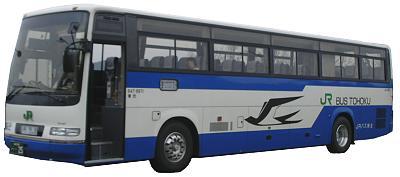| basic information |

Highway buses (kosoku bus) can be an attractive alternative to trains for long and medium distance travel in Japan. While highway buses tend to be slower than express trains, they are typically between 20 and 50 percent cheaper. Furthermore, by taking an overnight bus, one can save on accommodation.
Highway bus routes
Japan is covered by a dense highway bus network. Every prefecture and larger city is served by at least one bus company, operating lines into other parts of the country. On major routes, such as the Tokyo - Nagoya - Kyoto - Osaka route, fierce competition has resulted in very low fares. On most other routes, the bus companies are often cooperating rather than competing with each other.
How to use highway buses
Seat reservations are necessary on most long distance buses. Reservations can be made at major bus terminals, through travel agents, by phone (usually in Japanese only, phone numbers are published on the bus companies' websites) or online (in Japanese only, see links below). Reservations for JR highway buses can also be made at ticket counters of JR railway stations.
Making a reservation one or more days in advance is recommended especially on popular routes and during busy travel seasons. However, if there is space left, it is also possible to get a seat reservation just prior to departure at the bus terminal.
Ticket types
On most routes, three types of tickets are available: one way tickets, round trip tickets and booklets of multiple tickets (kaisuken):
Round trip tickets are typically around 10 percent cheaper than two one way tickets. However, the return trip has to be made within a certain time frame, typically within six to ten days following the outward journey.
Booklets of multiple tickets usually include four or five tickets and are discounted by about 10 percent compared to single tickets. The tickets need to be used within a certain time frame, which is typically three months following the purchase.
Furthermore, there are usually discounts for children (aged 6-12), students and groups.
Note that the Japan Rail Pass is not valid on most highway buses, even on highway buses operated by JR bus companies. Among the few exceptions are the JR buses between Morioka and Hirosaki/Aomori, Tokyo and Nagoya/Kyoto/Osaka/Tsukuba, and Nagoya and Kyoto/Osaka.
Types of buses
Many overnight buses are equipped with comfortable, reclining seats, which are arranged in rows of three seats and two aisles. On cheap overnight buses and most daytime buses, standard buses with four seats per row are commonly used.
Most buses come with a toilet and phone on board, and make regular toilet stops along the way. Smoking is not permitted on most highway buses nowadays.
Double decker buses are used on selected routes.
No comments:
Post a Comment